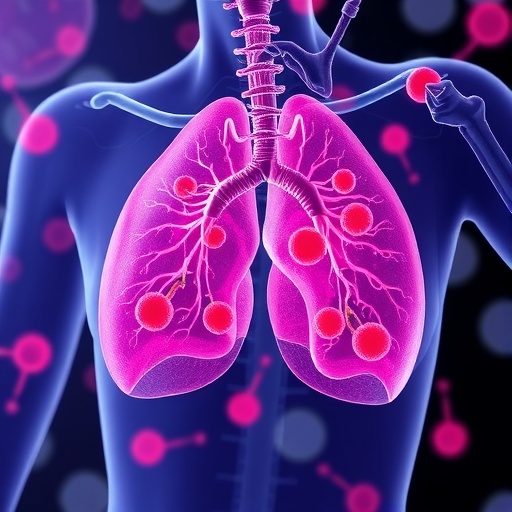In a groundbreaking study poised to reshape therapeutic approaches for Taiwanese breast cancer, researchers led by Ko-Cheng Ku have effectively married functional proteomics with next-generation sequencing. This innovative integration not only sheds light on the complex biological mechanisms underpinning breast cancer but also uncovers potential therapeutic targets that may lead to more effective treatments. Breast cancer represents a significant health crisis in Taiwan, with incidence rates rising sharply over recent decades. Understanding the molecular underpinnings of this disease is crucial for developing targeted therapies that could enhance patient outcomes.
The research utilizes advanced methodologies to dissect the protein expressions and genetic variations characteristic of Taiwanese breast cancer patients. By employing functional proteomics, the team was able to profile the proteins present in tumor biopsies, capturing a dynamic snapshot of the disease at the molecular level. This technique allows for the identification of specific protein markers that may serve as indicators of a patient’s response to treatment, thereby personalizing therapy and improving prognostic accuracy.
Coupled with next-generation sequencing, the study delves deep into the genomic landscape of breast cancer. This sequencing approach permits an exhaustive examination of mutations within the cancer genome, facilitating the mapping of genetic changes that contribute to tumorigenesis. The synergy between proteomics and sequencing not only reveals mutations but also correlates them with protein activity, offering a more comprehensive understanding of how these alterations drive cancer progression.
The implications of the findings are profound. By pinpointing specific proteins and genes that are aberrantly expressed in Taiwanese breast cancer, the researchers have opened new avenues for targeted therapy. These targets could be instrumental in crafting personalized treatment regimens that specifically address the unique biological features of this population’s breast cancers. The quest for effective therapies is particularly urgent given the aggressive nature of some breast cancer subtypes prevalent among Taiwanese women.
One focal point of the research is the identification of biomarkers that correlate with treatment resistance. Many breast cancer patients experience relapse or do not respond adequately to conventional therapies. By illuminating the functional roles of specific proteins involved in driving resistance mechanisms, the study lays the groundwork for the development of novel drug combinations. This could potentially enhance the efficacy of existing therapies, ultimately improving survival rates.
The researchers also highlighted the role of the tumor microenvironment in breast cancer progression. Understanding how tumor-associated proteins interact with surrounding cells and signaling pathways is vital for comprehending the disease’s complexity. The study emphasizes that the tumor microenvironment can influence not only tumor growth but also the effectiveness of therapeutic strategies. By elucidating these interactions, the research paves the way for innovative treatments that target both the cancer cells and their supportive microenvironment.
Furthermore, the use of bioinformatics tools to analyze the data generated from both proteomics and genomics was crucial in drawing meaningful conclusions. These computational approaches allowed the researchers to sift through vast amounts of data, identifying key players in breast cancer etiology. The integration of bioinformatics with laboratory findings demonstrates the multifaceted nature of contemporary cancer research, where data-driven insights can lead to actionable therapeutic strategies.
As this study opens new horizons for targeted cancer therapies, it also raises important questions about the implementation of these findings in clinical settings. Translating research into practice remains a critical challenge. The path from discovery to patient care requires rigorous clinical trials to validate the efficacy and safety of potential new treatments. The researchers acknowledge that while their findings are promising, the journey toward clinical application will necessitate collaboration between scientists, clinicians, and regulatory bodies.
The researchers also emphasize the ethical considerations surrounding genetic testing and personalized medicine. As more targeted therapies become available based on the specific molecular profiles of tumors, it’s crucial to navigate the complexities of informed patient consent and the implications of genetic findings. The potential for genetic discrimination and the psychosocial impact of knowing one’s genetic predisposition to certain diseases must be addressed as part of the broader conversation about precision oncology.
In conclusion, the integration of functional proteomics and next-generation sequencing presents a transformative opportunity in the fight against breast cancer, particularly within Taiwanese populations. By identifying actionable therapeutic targets, this research not only contributes to scientific knowledge but also heralds a new era of personalized medicine. The urgency of addressing breast cancer underscores the importance of continued investigation into the molecular dynamics of this disease, ensuring that innovative therapies are developed and made accessible to women who need them.
As the research community continues to unravel the complexities inherent in breast cancer, the collaborative spirit exhibited by this team of researchers serves as a beacon of hope. The findings may very well inspire future studies aimed at further elucidating the mechanisms of cancer and refining therapeutic strategies that leverage detailed molecular insights for improved patient care. This exceptional work not only enhances our understanding of breast cancer biology but also elevates the potential for creating tailored therapies that could ultimately save lives.
Subject of Research: Breast cancer targeting through functional proteomics and next-generation sequencing.
Article Title: Integrating functional proteomics and next generation sequencing reveals potential therapeutic targets for Taiwanese breast cancer.
Article References: Ku, WC., Liu, CY., Huang, CJ. et al. Integrating functional proteomics and next generation sequencing reveals potential therapeutic targets for Taiwanese breast cancer. Clin Proteom 22, 4 (2025). https://doi.org/10.1186/s12014-025-09526-8
Image Credits: AI Generated
DOI: 10.1186/s12014-025-09526-8
Keywords: Breast cancer, functional proteomics, next-generation sequencing, personalized medicine, therapeutic targets.




